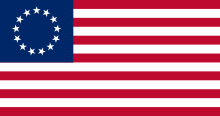1787 in the United States
| 1787 in the United States | |
|---|---|
| Years: | 1784 1785 1786 – 1787 – 1788 1789 1790 |
|
| |
 13 stars, the Betsy Ross version (1777–95) | |
|
Timeline of United States history
| |
Events from the year 1787 in the United States.
Incumbents
Federal Government
Governors
- Governor of Delaware: Thomas Collins (no political party) (starting December 7)
- Governor of New Jersey: William Livingston (Federalist) (starting December 18)
- Governor of Pennsylvania: Benjamin Franklin (Independent) (starting December 12)
Events
January–March
- January 6 – The North Carolina General Assembly authorizes nine commissioners to purchase 100 acres (0.40 km2) of land for the county seat of Chatham County. The town is named Pittsborough (later shortened to Pittsboro) for William Pitt the Younger.
- February 28 – A charter is granted establishing the institution known today as the University of Pittsburgh.
April–June
- May 14 – In Philadelphia, Pennsylvania, delegates begin arriving to write a new Constitution for the United States.
- May 25 – In Philadelphia, Pennsylvania, delegates begin to convene a Constitutional Convention intended to amend the Articles of Confederation. However, a new Constitution for the United States is eventually produced. George Washington presides over the Convention.
- June 6 – Franklin College, named for Benjamin Franklin, opens in Lancaster, Pennsylvania. It later merges with Marshall College to become Franklin and Marshall College.
- June 20 – Oliver Ellsworth moves at the Federal Convention that the government be called the United States.
July–September
- July 13 – The U.S. Congress enacts the Northwest Ordinance establishing governing rules for the Northwest Territory. It also establishes procedures for the admission of new states including gridded townships and limits the expansion of slavery.
- August 27 – Launching a 45-foot (14 m) steam powered craft on the Delaware River, John Fitch demonstrates the first U.S. patent for his design.
- September 17 – The United States Constitution is adopted by the Constitutional Convention in Philadelphia.
October–December
- October 27 – The first of The Federalist Papers, a series of essays, written by Alexander Hamilton calling for ratification of the U.S. Constitution, is published in a New York paper. (John Jay and James Madison participated in the writing of the Federalist papers as well).
- December 7 – Delaware ratifies the Constitution and becomes the first U.S. state (see History of Delaware).
- December 8 – Mission La Purisima Concepcion is founded by Father Fermín Francisco de Lasuén, becoming the 11th mission in the California mission chain.
- December 12 – Pennsylvania becomes the second U.S. state (see History of Pennsylvania).
- December 18 – New Jersey becomes the third U.S. state (see History of New Jersey).
Undated
- The North Carolina General Assembly incorporates Waynesborough and designates it the county seat for Wayne County, North Carolina.
Ongoing
- Articles of Confederation in effect (1781–1788)
- Northwest Indian War (1785–1795)
Births
- January 10 – Robert C. Nicholas, United States Senator from Louisiana from 1836 till 1841. (died 1857)
- March 28 – Theodore Frelinghuysen, running mate of Henry Clay in 1844 (born 1862)
- May 7 – Thomas Buck Reed, United States Senator from Mississippi from 1826 till 1827 and in 1829. (died 1829)
- August 20 – John Milton Niles, United States Senator from Connecticut from 1835 till 1839 and from 1843 till 1849. (died 1856)
- September 10 – John J. Crittenden, United States Senator from Kentucky 1817-1819, 1835-1841, 1842-1848, and 1855-1861. (died 1863)
- December 10 – Thomas Hopkins Gallaudet, Minister, educator, co-founder of the first permanent school for the Deaf in North America. (died 1851)
- Date Unknown – Oliver H. Prince, United States Senator from Georgia from 1828 till 1829. (died 1837)
Deaths
April
- April 3
- George William Fairfax, planter and member of the landed gentry of late colonial Virginia]] (b. 1729)
August
- August 27
- Charles DeWitt, planter and member of the landed gentry of late colonial Virginia (b. 1727)
October
- October 5
- Thomas Stone, an American planter and lawyer who signed the United States Declaration of Independence. (b. 1743)
Date unknown
- William Savery (b. 1721 or 1722)
External links
-
 Media related to 1787 in the United States at Wikimedia Commons
Media related to 1787 in the United States at Wikimedia Commons
This article is issued from Wikipedia - version of the 11/15/2016. The text is available under the Creative Commons Attribution/Share Alike but additional terms may apply for the media files.